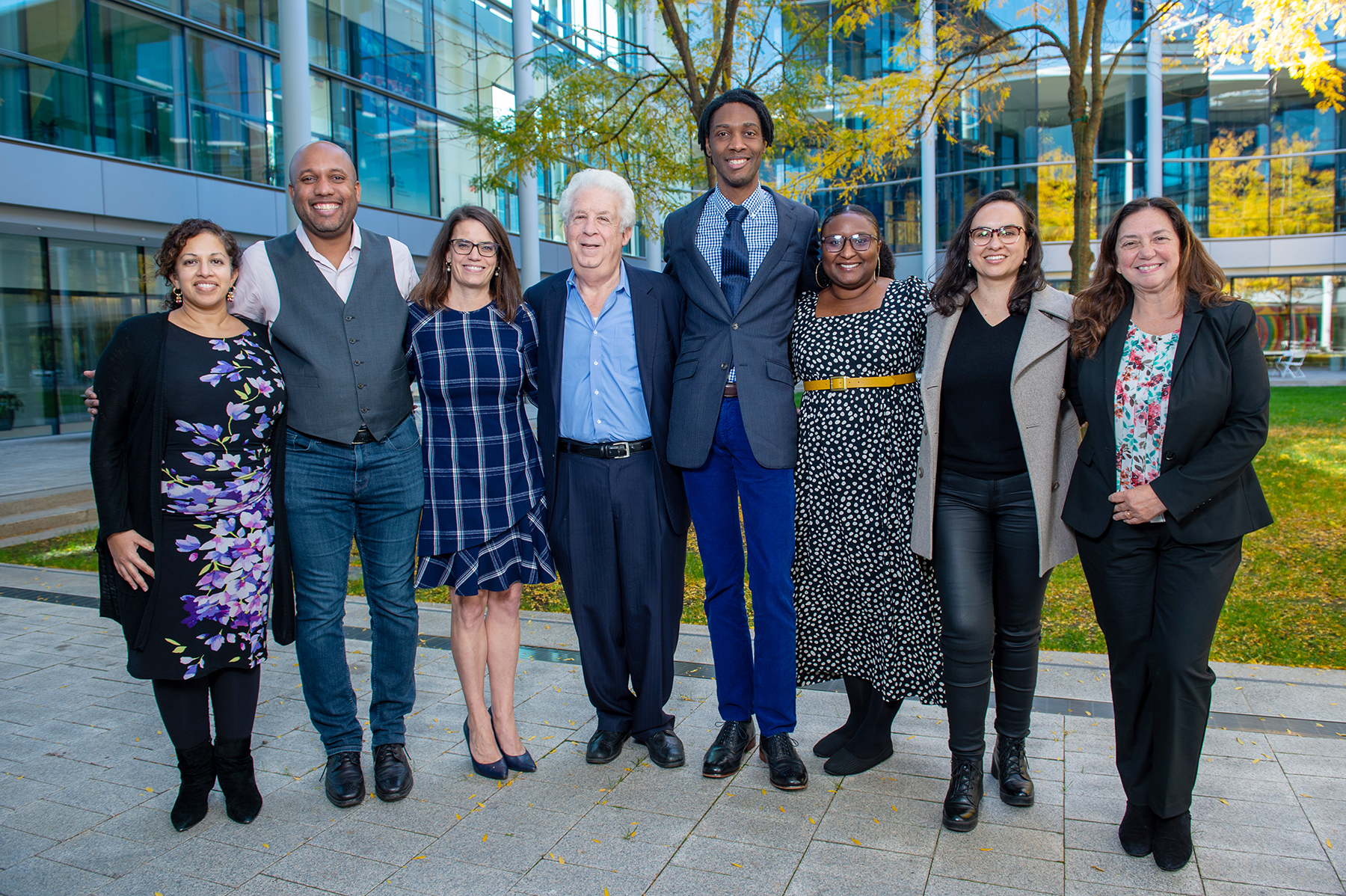The Pozen-Commonwealth Fund Fellowship in Health Equity Leadership at Yale University is a 22-month, degree-granting program that covers the cost of the MBA for Executives program and gives healthcare professionals the leadership skills and the deep understanding of teams, markets, and organizations necessary to tackle major inequities in the U.S. healthcare system. The fellowship also covers the cost of accommodations on Friday nights of class weekends, as well as Thursday nights when required by the fellowship program. The Fellowship includes a suite of educational, co-curricular, and practical experiences and activities that work in concert with a rigorous executive MBA program, designed to help accelerate the capabilities of emerging leaders, including a yearly domestic immersion experience, a health equity leadership workshop series, mentorship with faculty and national board of advisors and a required capstone project.
About the Fellowship
Fellows earn an MBA over 22 months, completing Yale SOM’s integrated MBA core curriculum, participating in colloquia with other healthcare leaders, and taking advanced courses in management and healthcare. The executive MBA format, which includes classes every other weekend and four residence weeks, including one Global Network Week abroad, allows them to continue in their current roles while building business acumen and gaining valuable leadership capabilities. In addition, Pozen-Commonwealth Fund Fellows benefit from mentoring, domestic policy immersion trips, and hands-on project opportunities centered on health equity issues.
The Pozen-Commonwealth Fund Fellowship was endowed by a generous gift from Robert C. Pozen, a member of the Yale Law School Class of 1972 and is also sponsored by The Commonwealth Fund and the Yale School of Management MBA for Executives program.

Admissions
The Pozen-Commonwealth Fund Fellowship is open to healthcare professionals and leaders who are committed to improving healthcare access and outcomes for disparity populations. Preferred applicants should have at least seven years work experience, beyond any formal clinical training, and a demonstrated track record in healthcare equity.
Pre-Assessment
Prospective students are encouraged to register for a pre-assessment. Get personalized feedback from a member of the admissions team and learn whether the MBA for Executives program and the Pozen-Commonwealth Fund Fellowship is right for you.
Application
To apply to the fellowship, complete the application for the MBA for Executives program and select the healthcare area of focus. When prompted, confirm you are applying to the Pozen-Commonwealth Fund Fellowship and complete the corresponding essays. The application to the fellowship is open to all rounds, with maximum consideration for those applying in Round 1 and Round 2. Please see the deadlines below.
Round 1: October 28, 2024
Round 2: January 27, 2025
Round 3: March 10, 2025
Meet our fellows
Leadership
Dr. Marcella Nunez-Smith, C.N.H. Long Professor of medicine and of epidemiology at the Yale School of Medicine and associate professor of management at the Yale School of Management, is co-founder and director of the Pozen-Commonwealth Fund Fellowship.
Dr. Howard P. Forman, professor of radiology, economics, public health, and management, is the co-founder of the MBA for Executives program and faculty director of the Healthcare area of focus and co-founder of and special advisor to the Pozen-Commonwealth Fund Fellowship.
Dr. Rosana Gonzalez-Colaso, assistant professor of medicine at the Yale School of Medicine, Director of Research Education and Deputy Director of Diversity, Equity, and Inclusion at the Yale Physician Associate Program, is associate director of the Pozen-Commonwealth Fund Fellowship.
Dr. Cece Calhoun, assistant professor of medicine (hematology) at the Yale School of Medicine and medical director of the Sickle Cell Program, is assistant director of the Pozen-Commonwealth Fund Fellowship.
Advisory Committees
The Pozen-Commonwealth Fund Fellowship benefits from the involvement of two committees whose members help guide the program and serve as mentors to the fellows. The National Advisory Committee is comprised of senior leaders in the healthcare field with a diversity of geography, careers, and backgrounds, while the Institutional Advisory Committee is made up of senior leaders across Yale University whose work intersects with the goals of the fellowship.
National Advisory Committee (NAC) Members
Daniel Dawes, JD
Senior Vice President, Global Health & Executive Director, Institute of Global Health Equity, Meharry Medical College
Mary-Ann Etiebet, MD, MBA
President and CEO, Vital Strategies
Dr. Kennetha Gaines, RN, DNP, MA, MURP, MBA, CNL, PHN, CLEC
Director of Nursing, UCLA Health
Clarion E. Johnson, MD
Former Global Medical Director, ExxonMobil
Octavio N. Martinez, Jr., MD, MPH, MBA (NAC Chair)
Senior Associate Vice President, Division of Diversity and Community Engagement; Executive Director, Hogg Foundation for Mental Health; Clinical Professor, Steve Hicks School of Social Work; Professor of Psychiatry, Dell Medical School, The University of Texas at Austin
Steven Starks, MD, FAPA, MBA
Clinical Assistant Professor at the Tilman J. Fertitta Family College of Medicine
Learn More
Health Equity Virtual Master Class
Pozen-Commonwealth Fund Fellowship in Health Equity Leadership Welcomes Newest Fellows
Webinar: Pozen-Commonwealth Fund Fellowship in Health Equity Leadership
Pozen-Commonwealth Fund Fellows Explore Health Equity Solutions in Capstone Projects
Health & Veritas: Taking on Systemic Inequities
Fatimah Loren Dreier '22: Talking About “Firearm Injury” and “Gun Violence”: Words Matter
Major Gift Endows Commonwealth Fund Fellowship in Minority Health at Yale
Contact
Contact the MBA for Executives program at emba.admissions@yale.edu with questions about the Pozen-Commonwealth Fund Fellowship and the EMBA program.

The mission of The Commonwealth Fund is to promote a high-performing health care system that achieves better access, improved quality, and greater efficiency, particularly for society's most vulnerable, including people of color, people with low income, and those who are uninsured.


